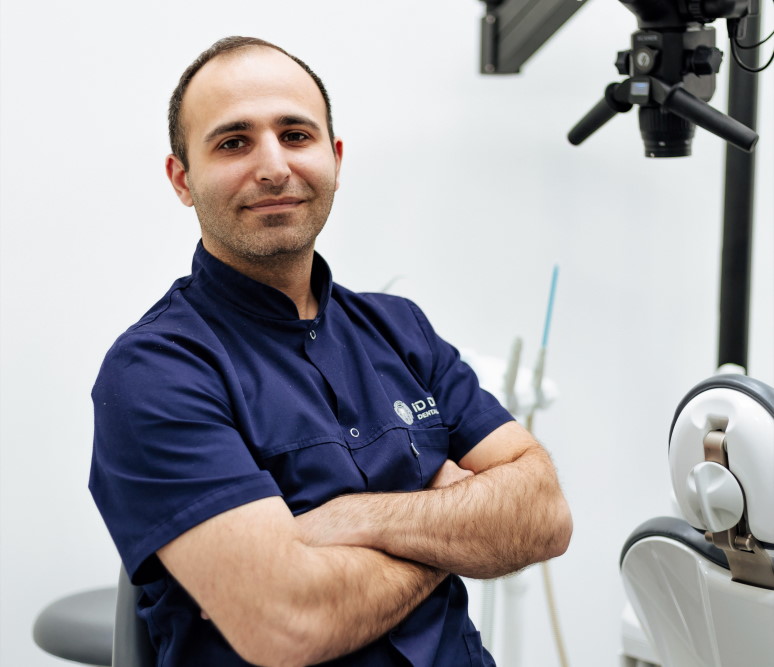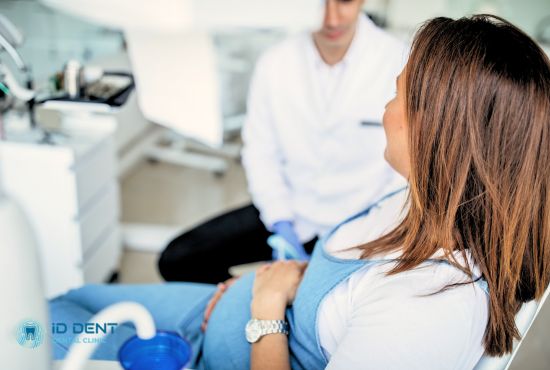Dentistry for Pregnant Women
Dentistry for Pregnant Women — a pledge of health and a beautiful smile! Our dentistry knows the nuances of dental treatment for pregnant women perfectly, using only safe methods. Welcome to the ID Dent clinic!
| Trimester Specifics | Different trimester timings |
| Planned Visits | Once every 6 months |
| Common Procedures | Pain relief, hygiene |
| Profile and Care | Gingivitis, caries correction |

During pregnancy, it is crucial for a woman to monitor the condition of her teeth and gums. During this period, when the body is subject to hormonal changes, a wide range of issues can occur: gum bleeding,... Read more
During pregnancy, it is crucial for a woman to monitor the condition of her teeth and gums. During this period, when the body is subject to hormonal changes, a wide range of issues can occur: gum bleeding, caries development, and more. It is the woman’s task to contact a dentist for safe, gentle treatment timely.
At our clinic ID Dent, we provide urgent dental services for pregnant women, ensuring safe and effective treatment. Our dentists undergo special training and have the needed experience to work with pregnant patients. We guarantee the high quality and reliability of our services, we know how to deal with toothache, gum bleeding, and safely and effectively treat caries. We are waiting for you at our clinic on Lesnoy massif!

Pregnancy is a special period in a woman’s life when taking care of one’s health and the health of the future child becomes particularly significant. One area that demands attention is the condition of the teeth and gums. Many women have questions about the possibility and necessity of treating their teeth, diagnosis, and prevention of dental diseases during this period. You can receive professional help at ID Dent. Pregnancy dentistry in Kyiv — is something we know everything about. At the ID Dent clinic in Kyiv, we offer a full spectrum of dental services for future moms: safely, effectively, painlessly, and without stress. Entrust your smile to us!
Pregnancy is an essential time for forming the dental health of the child and maintaining it in the pregnant mother, where the main role should be played by future parents, optimally directed and guided by dentists.
Can Teeth Be Treated During Pregnancy?
The unequivocal answer is yes, teeth can be treated during pregnancy. However, it’s important to take into account certain features of this period. Before starting treatment, the dentist must absolutely inspect the future mother and decide on the necessity of this or that procedure only with the consent of the leading gynecologist. Certain restrictions exist on using radiological methods and some medications, so it is important to inform the dentist of your condition.
At the same time, serious interventions like surgical tooth treatment, bite correction, and others are not recommended during pregnancy. All therapeutic methods aim at strengthening the teeth and maintaining their health.
Dentist’s advice: when preparing for pregnancy, a woman should take care not only of her body as a whole but also of the condition of her teeth. Visit a dentist for a complete oral cavity diagnosis, undergo complete caries treatment. This will significantly reduce the risk of dental diseases appearing during pregnancy.
It is important to inform your dentist about your pregnancy and provide all necessary information such as the pregnancy term, medications you are taking, and possible changes in health.
How Often Should Pregnant Women Visit the Dentist?
During pregnancy, it is recommended to regularly visit the dentist for preventive checkups and maintaining oral health. The interval between visits can vary depending on individual characteristics and the state of the teeth and gums. Generally, visiting the dentist at least once every 6 months is recommended.
Women with weak tooth enamel, prone to caries and inflammatory oral diseases should schedule prophylactic checkups more often: once every 4 months. Your dentist will create an individual clinic visit schedule for you, focusing on the individual clinical picture.
Tooth Diagnosis During Pregnancy
The treatment of pregnant women in dentistry is impossible without thorough preliminary research. Dental and oral cavity diagnostics is a crucial part of dental care for pregnant women. The doctor examines the oral cavity, assesses the condition of the teeth and gums, and may use other diagnostic procedures as needed.
Observation by a dentist during pregnancy includes systematic and local measures to prevent tooth decay and periodontal diseases, normalization of nutrition, hygiene education and training of women, appointment of antenal preventive tools, if necessary, treatment of dental diseases.
Dental Treatment of Pregnant Women in Different Trimesters

Dentistry treatment in case of acute necessity in pregnant women can be carried out during any trimester. However, some procedures may be preferable to perform at certain times:
- 1st trimester (1-12 weeks). During this period, the foundations of the child’s organs are being laid, but the placenta is not yet fully formed and cannot fully protect the fetus. Therefore, in the first trimester, one should, if possible, abstain from dental treatment. Hygienic cleaning in the dentist’s chair and enamel strengthening are possible. More complex procedures are performed only on strict indications.
- 2nd trimester (13-24 weeks). The best period for resolving dental issues. The placenta is already formed and reliably protects the child in the womb of the mother from unfavorable factors. Routine dental treatment and, if necessary, caries treatment are carried out in the 2nd trimester.
- 3rd trimester. After 25 weeks, dental treatment is better avoided. The woman’s body becomes very sensitive, and unnecessary stress should be minimized. Exceptions include acute conditions requiring immediate doctor’s intervention, such as acute tooth pain, tooth injuries, and periostitis (flux).
The doctor always takes into account the future mother’s condition and possible risks to her health and the fetus’s health when planning and conducting treatment.
What is Permissible to Treat During Pregnancy?
During pregnancy, various oral diseases and problems can be treated:
- Caries. Caries treatment during pregnancy is quite possible. Safe methods like removing the affected tooth tissue and filling are usually used. It is important to choose safe filling materials and discuss possible anesthesia options with the doctor.
- Periodontitis. Safe methods are used to help quickly and effectively eliminate the disease.
- Gingivitis. If you experience gum inflammation, the doctor can perform professional oral hygiene, tartar and plaque removal, and provide recommendations for home care for gums and teeth.
Regular cleanings and examinations by the dentist will help prevent the development of problems and maintain oral health during pregnancy.
It is crucial to choose treatment methods that minimally affect the mother’s body and pose no risk to fetal development. Consulting with a dentist will help determine the optimal treatment plan, taking into account the individual characteristics of each future mom.

What Do Dentists Not Recommend Treating During Pregnancy?
During pregnancy, dentists typically advise postponing certain procedures and treatment, especially in the first trimester when the organs and systems of the child are actively developing. These procedures include surgery, some anesthesia forms, and certain antibiotics. When planning treatment, the dentist takes these recommendations into account and selects safe and effective methods.
Some medications used for anesthesia or disinfection may have potentially negative effects on the developing fetus. Therefore, the dentist may recommend using only safe and approved drugs.
During pregnancy, orthodontic procedures like installing braces or conducting orthodontic surgeries are also not recommended. Bite correction is better done before pregnancy or after, once the woman has completed breastfeeding.
Further restrictions during pregnancy:
- Tooth extractions should be avoided as they are quite complex and stressful, requiring the use of serious anesthetics.
- Computer tomography is unsafe for the developing baby and should be refrained from.
- General anesthesia or sleep sedation should not be used.
- Teeth whitening should be avoided as pregnant women’s teeth enamel is thin and sensitive.
How to Strengthen Teeth During Pregnancy?
Strengthening teeth and preventing oral diseases during pregnancy is achieved through regular and proper care. It’s important to maintain oral hygiene, regularly brush teeth, and use dental floss. The diet should be balanced and include necessary microelements and vitamins for dental health.
Let’s look at recommendations for strengthening teeth during pregnancy in more detail:

- Proper nutrition. A balanced diet rich in calcium, phosphorus, and other vitamins and minerals helps strengthen tooth enamel. Include dairy products, fresh fruits and vegetables, fish, eggs, and nuts in your diet.
- Regular oral hygiene. Try to brush your teeth twice a day with a soft-bristled brush and fluoride toothpaste. Don’t forget to also use dental floss or interdental brushes for cleaning spaces between teeth.
- Visiting the dentist. Regular visits to the dentist will help identify and address problems with the teeth early on before they worsen. Be sure to inform your dentist about your pregnancy so they can consider all the specifications of your condition when providing treatment.
- Limit consumption of sweet and acidic foods. Avoid frequent consumption of sweet and acidic foods as they can lead to tooth enamel destruction. If you consume them, try to rinse your mouth immediately afterwards with water or a fluoride mouthwash.
- Drink water with reduced acidity: Drinking water with reduced acidity helps reduce acidity in the mouth, which positively affects the teeth.
- Avoid smoking and alcohol consumption. Smoking and alcohol consumption can negatively impact dental health and overall health, so it is recommended to avoid them entirely during pregnancy.
In some cases, the dentist may suggest additional procedures for enamel strengthening, such as fluoride treatment.
How is the Price for Dental Treatment During Pregnancy in Kyiv from ID Dent Formed?
The price for dental treatment during pregnancy in Kyiv from ID Dent is formed depending on several factors, including the complexity of the treatment, necessary procedures, oral cavity condition, and individual features of each patient. It is recommended to contact our clinic for a consultation and cost assessment, as only experienced dentists can provide accurate information and suggest optimal treatment for each pregnant woman.
Remember that taking care of dental and oral health during pregnancy is an essential aspect of the overall health of the future mother and her child. Regular dentist visits, proper care, and timely treatment will help maintain dental health and prevent potential complications.
Need dental help for pregnant women? We await you at ID Dent. Our medical center location: Kyiv, Left Bank, Lesnoy massif. Nearest metro stations — Lesnaya and Chernigovskaya.
List of Used Literature:
- A.S. Ivanov. Prevention of dental diseases in pregnant women. – 2019. – 143p.
- V.A. Kuzmina. Dental status of pregnant women depending on pregnancy features / V.A. Kuzmina, I.I. Yakubova, T.A. Buchinskaya // Modern dentistry. – 2015. – No. 3. – pp. 51-55.
- L.I. Ostrovskaya. Characteristics of the dental status of women during pregnancy and lactation // Current problems of modern medicine: Bulletin of the Ukrainian Medical Dental Academy. – 2010. – Vol. 10. – No. 1(29). – pp. 161-164.
Frequently asked Questions
What dental services are available for pregnant women?
Those that do not require radical intervention. Pregnant women can (and should) undergo dental exams, treat caries when it flares up. But it's best to treat all teeth before planning pregnancy so that sudden tooth pain doesn't spoil this beautiful period.
How can pregnancy affect women's oral cavity condition?
Pregnancy can lead to changes in a woman's body that can affect the oral cavity, such as an increased risk of developing caries, gingivitis, or periodontitis.
How much does dental treatment for pregnant women in Kyiv cost?
Prices for dental treatment in Kyiv may vary depending on the specific clinic, doctor, and complexity of treatment. You can find out the cost of treatment with us during a dentist consultation.
Can you go to the dentist during pregnancy?
Yes, pregnant women can go to the dentist. The dentist should be informed of your condition and pregnancy to take proper precautions and offer safe treatment methods.
At what stage of pregnancy can teeth be treated with anesthesia?
Teeth treatment with anesthesia can be done at any stage of pregnancy only with the consent of your leading gynecologist.
During which trimester should teeth not be treated?
Dental treatment can be carried out throughout pregnancy. However, in the first trimester when active development of the child’s organs and systems takes place, some procedures can be postponed if they are not urgent or necessary for the mother's health. Also, it is not recommended to treat teeth in the third trimester.
Can you give birth with bad teeth?
The condition of the teeth can affect overall health, so it is desirable to have good oral health before childbirth. However, bad teeth do not directly influence the childbirth process.
How does anesthesia affect the fetus?
The effect of anesthesia on the fetus is usually minimal when applied correctly. Many anesthesiologists and dentists choose safe methods and doses of anesthesia for pregnant women to minimize potential risks. However, it is important to discuss any possible risks and side effects of anesthesia with your doctor before undergoing the procedure.
How many times should you visit the dentist during pregnancy?
It is recommended to visit the dentist several times during pregnancy. Regular visits will help detect and treat tooth and gum problems at an early stage. The frequency of visits may vary depending on your condition and doctor’s recommendations.
When is the first dental examination conducted for pregnant women?
The first dental examination is recommended to be done as early as possible after pregnancy confirmation. This will allow the doctor to assess the oral cavity's condition, consider possible problems, and develop an individual treatment and prevention plan.

 Kyiv, st. Bratislavskaya 14B
Kyiv, st. Bratislavskaya 14B Mon.-Fri. 9-20, Sat.-Sun. 10-18
Mon.-Fri. 9-20, Sat.-Sun. 10-18


